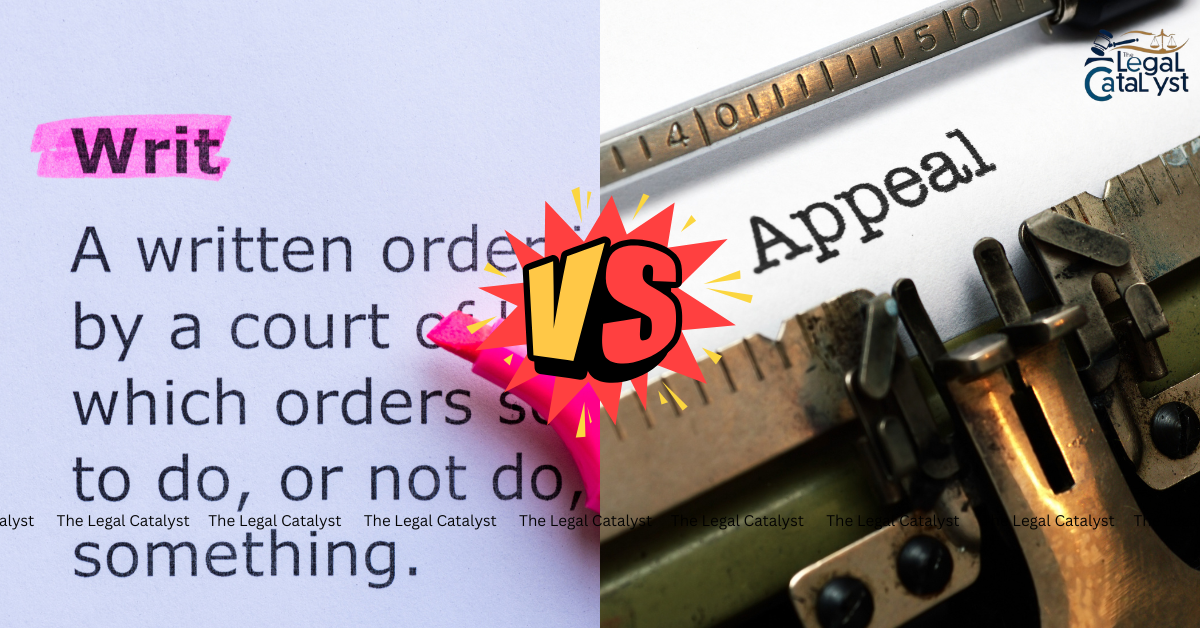In the Indian legal system, both writs and appeals are essential remedies. However, they serve different purposes. They also apply in different circumstances. Appeals challenge decisions of lower courts. Writs are extraordinary remedies to enforce fundamental rights. They address legal wrongs where no alternative remedy is sufficient.
Understanding this difference helps you choose the right legal route for effective justice.
What is a Writ?
A writ is a constitutional remedy. It is a formal written order issued by the High Court (Article 226). It is also issued by the Supreme Court (Article 32). This order is to protect fundamental rights or to check illegal actions by public authorities.
Who Can File:
Any individual whose fundamental right has been violated
Where to File:
- Supreme Court (Article 32)
- High Court (Article 226)
Nature:
- Extraordinary remedy
- Discretionary power of the court
Purpose:
To ensure that public authorities do not abuse their power and to safeguard individual liberties.
Types of Writs in India:
- Habeas Corpus – To release a person unlawfully detained
- Mandamus – To direct a public authority to perform a duty
- Certiorari – To quash an illegal order passed by a lower court or tribunal
- Prohibition – To stop a lower court from proceeding in a case outside its jurisdiction
- Quo Warranto – To question the legality of a person holding a public office
Connect with us on Instagram – X – LinkedIn for daily updates, quizzes, and other materials.
What is an Appeal?
An appeal is a statutory right to challenge a decision of a lower court or tribunal in a higher court. It is part of the normal judicial hierarchy, unlike writs which are constitutional powers.
Who Can File:
The aggrieved party in a judgment or order
Where to File:
- District Court → High Court → Supreme Court (depending on the case hierarchy)
Nature:
- Ordinary legal remedy
- Based on a legal right, not court discretion
Purpose:
To correct legal or factual errors in a lower court’s decision.
Types of Appeals:
- Civil Appeal – In civil cases (e.g., property, contracts)
- Criminal Appeal – In criminal matters (e.g., conviction, sentence)
- Constitutional Appeal – In cases involving constitutional interpretation
- Special Leave Petition (SLP) – Appeal to Supreme Court under Article 136
- Appeal from Tribunal Orders – From bodies like NCLT, CAT, or SAT to higher courts
Key Differences Between Writs and Appeals
| Criteria | Writs | Appeals |
|---|---|---|
| Source of Power | Constitutional (Art. 32 & 226) | Statutory (Civil Procedure Code, CrPC, Specific Acts) |
| Filed Against | Public authorities/government actions | Court or tribunal decisions |
| Purpose | Enforce fundamental rights or prevent misuse of power | Challenge a legal or factual decision |
| Discretionary | Yes – court can refuse | No – if appeal is maintainable, it must be heard |
| Jurisdiction | High Court or Supreme Court | As per judicial hierarchy |
| Example | Illegal detention (Habeas Corpus) | Conviction in a lower court (Criminal Appeal) |
When Should You File a Writ Instead of an Appeal?
You should file a writ petition when:
- Your fundamental rights are directly violated
- No other effective legal remedy is available
- The public authority has acted illegally or beyond its powers
You should file an appeal when:
- You disagree with a decision passed by a court or tribunal
- You want the case to be reviewed on merits
- The statute provides you a right to appeal
Can You File Both?
Not usually. If a statutory remedy like appeal is available and effective, courts may refuse a writ petition. However, in urgent or exceptional cases, writs may be allowed. This is true even when appeals are possible, especially if there is a gross injustice or violation of fundamental rights.
Conclusion
Writs and appeals are two different but powerful tools in the hands of every Indian citizen. While appeals are used to correct judgments, writs serve to prevent misuse of power and enforce rights.
Knowing which remedy to pursue can save you time, cost, and procedural delays. Most importantly, it can ensure that justice is delivered fairly and efficiently.
Key Takeaways:
- Writs are constitutional, appeals are statutory
- Writs protect rights, appeals correct errors
- Use writs for public law matters, appeals for court decisions
- Writ jurisdiction is discretionary, appeal is a legal entitlement
Also Read
Understanding the Indian Judiciary System: Structure, Powers and Functions
Understanding the Right to Information (RTI) Act, 2005 India: A Citizen’s Tool for Transparency






